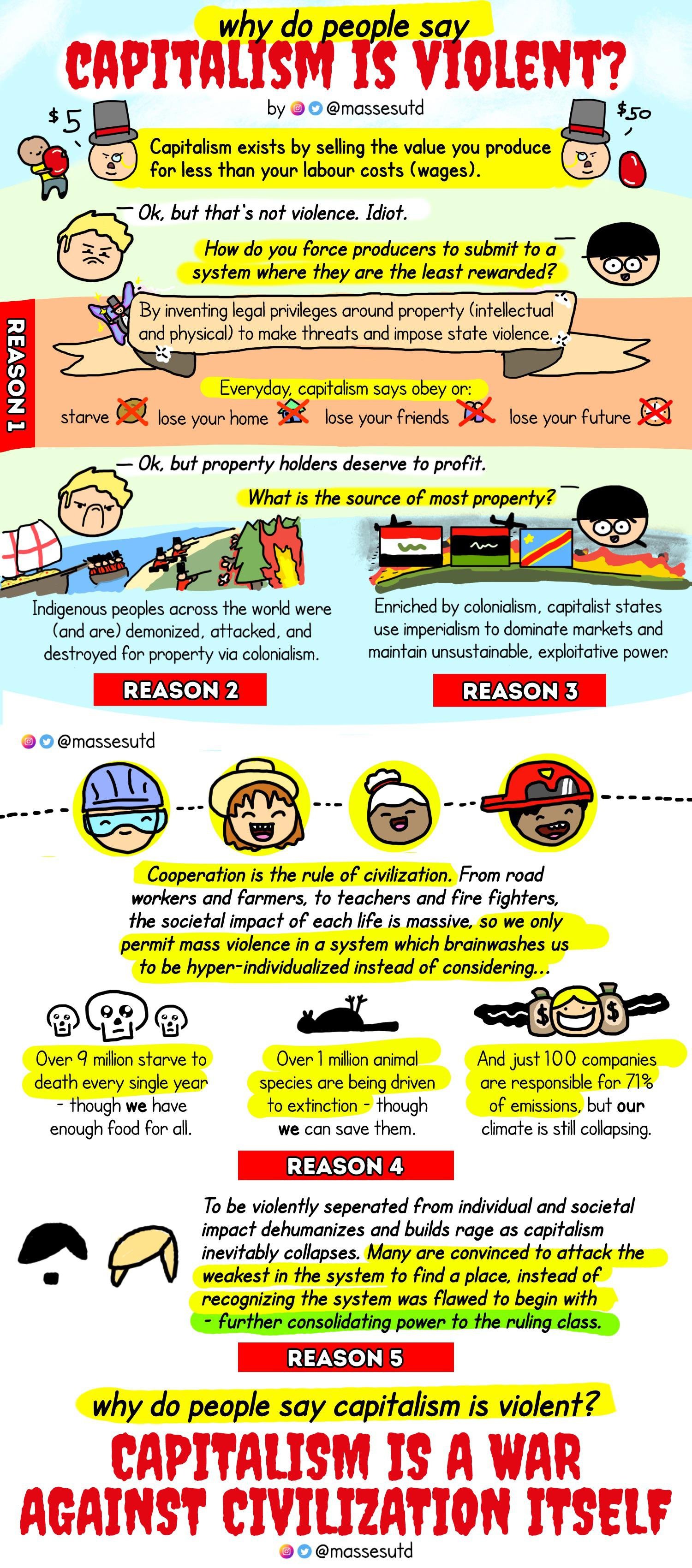Leftism
Our goal is to be the one stop shop for leftism here at lemmy.world! We welcome anyone with beliefs ranging from SocDemocracy to Anarchism to post, discuss, and interact with our community. We are a democratic community, and as such, welcome metaposts that seek to amend the rules through consensus. Post articles, videos, questions, analysis and more. As long as it's leftist, it's welcome here!
Rules:
- Absolutely no fascism, right wing extremism, genocide denial, etc.
- Unconditional support of authoritarians will not be tolerated
- Good faith discussion about ideologies is encouraged, but no sectarianism
- No brocialism/sexism
- No ableism
- No TERFs/ anti-LGBTQ+ rhetoric
- No racism
- No trolling
- No insults, dunking, or personal attacks
- No posting of misinformation, disinformation, or fake news
- Mods have final say
Posting Expectations:
- Comics/memes/shitposts/propaganda are only allowed on weekends
- Try to avoid liberalism unless discussing electoral politics. Even then, try to focus on tactical agreement towards leftist goals
- Only one meta post seeking consensus per person per day
- Posts about a particular ideology are ok, but remember the rules above
- Remember that there is no “right way” to implement leftist theory. This rule does not prevent academic criticism.
- Try to avoid extremely sensitive topics unless approaching them with appropriate care for intersectionality. Use your best judgement, and be prepared to provide respectable sources when having these discussions. Wikipedia is not an acceptable source in these cases.
- Post titles must be meaningful and relevant, except on weekends
Sister Communities:
[email protected] [email protected] [email protected] [email protected] [email protected] [email protected] [email protected] [email protected] [email protected] [email protected] [email protected] [email protected] Solarpunk memes [email protected] [email protected] [email protected] [email protected] [email protected]
view the rest of the comments

Can you define capitalism, real quick?
Capitalism is the societal system that began to take form within the historic period following the gradual collapse of the feudal order in Europe, but that became truly well formed in the wake of the industrial revolution.
Capitalism is characterized by the unbounded accumulation of private wealth by a small cohort of society, by asserting exclusive control over the means by which wealth is generated, and by claiming as profit a share of the value generated by the labor of the rest of society, depriving them from realizing the full value of their labor.
Alright so we're talking about different things.
Capitalism is private ownership of capital.
Capital is a revenue producing asset.
You're describing the social systems that form around capital and capitalism, which I agree are largely both presently and historically bad.
"Should" statements are moral statements. When it say capitalism should work a certain way, I mean that it must work a certain way in order to be moral.
What we have doesn't work that way.
Socialism and communism treat capital differently. As far as I understand the definitions:
Socialism refers to social/government ownership of capital, which is then supposed to benefit all members of the society.
Communism refers to no ownership of capital, or community ownership of capital the the broadest sense. All revenue produced is distributed to the people based on their needs.
I use these definitions outside of structure or information or morality, because we can talk about those once we agree on what we're talking about.
Private ownership of the means of production leads to division of society into classes with mutually antagonistic interests, boundless accumulation of private wealth, and workers being deprived of the full value of their labor.
Such are the inevitable structural consequences following from the protection of private property.
They cannot be wished away. If you accept private property, then you also accept a fantasy, from not understanding the material criticism of capital as a totalizing societal system, or you accept the consequences as I have identified them.
Socialism, and equivalently communism, is the political movement seeking the abolition of private property, and the class antagonisms that it requires and produces, toward the development of a classless society, in which the public asserts direct cooperative control over the economy.
Some movements have invoked the strategy that substantial state control over the economy would characterize a transitional stage occurring before the economy would be directly managed by the public.
However, socialists broadly reject state control of the economy as an ultimate objective, because state bureaucracy simply reproduces the same kinds of class antagonisms characteristic of capitalism, placing those within the state against those outside.
Anti-statist tendencies of socialism seek for the public to develop direct control of the economy without the control of the state.